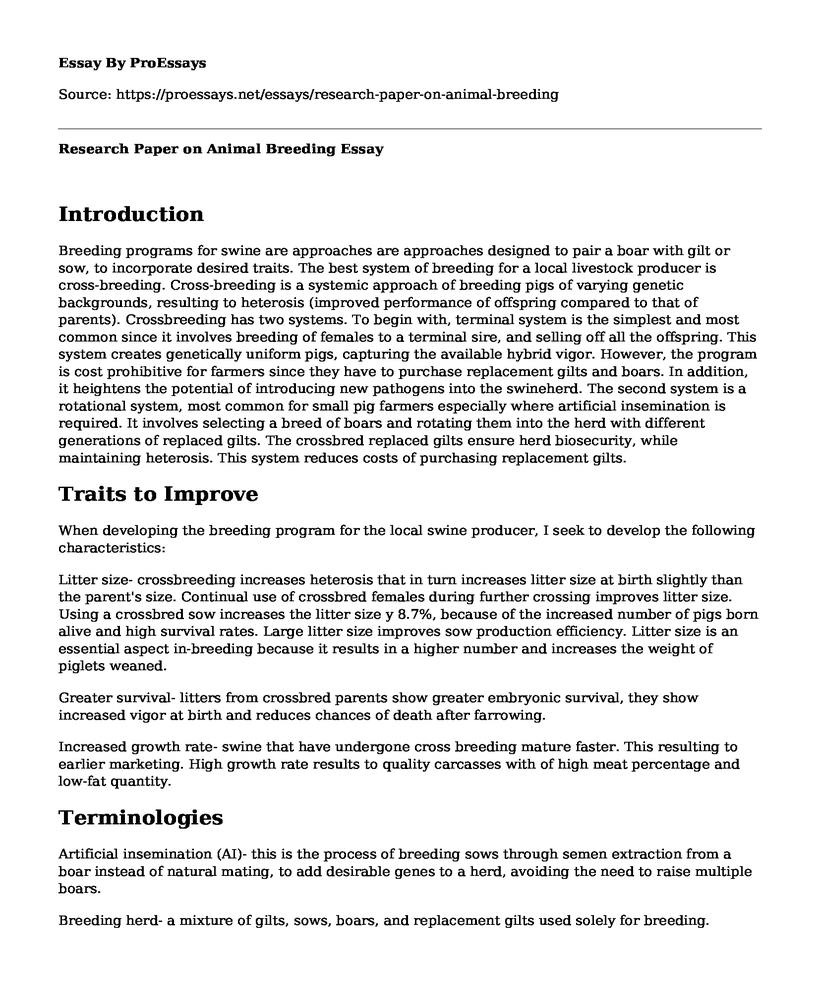Introduction
Breeding programs for swine are approaches are approaches designed to pair a boar with gilt or sow, to incorporate desired traits. The best system of breeding for a local livestock producer is cross-breeding. Cross-breeding is a systemic approach of breeding pigs of varying genetic backgrounds, resulting to heterosis (improved performance of offspring compared to that of parents). Crossbreeding has two systems. To begin with, terminal system is the simplest and most common since it involves breeding of females to a terminal sire, and selling off all the offspring. This system creates genetically uniform pigs, capturing the available hybrid vigor. However, the program is cost prohibitive for farmers since they have to purchase replacement gilts and boars. In addition, it heightens the potential of introducing new pathogens into the swineherd. The second system is a rotational system, most common for small pig farmers especially where artificial insemination is required. It involves selecting a breed of boars and rotating them into the herd with different generations of replaced gilts. The crossbred replaced gilts ensure herd biosecurity, while maintaining heterosis. This system reduces costs of purchasing replacement gilts.
Traits to Improve
When developing the breeding program for the local swine producer, I seek to develop the following characteristics:
Litter size- crossbreeding increases heterosis that in turn increases litter size at birth slightly than the parent's size. Continual use of crossbred females during further crossing improves litter size. Using a crossbred sow increases the litter size y 8.7%, because of the increased number of pigs born alive and high survival rates. Large litter size improves sow production efficiency. Litter size is an essential aspect in-breeding because it results in a higher number and increases the weight of piglets weaned.
Greater survival- litters from crossbred parents show greater embryonic survival, they show increased vigor at birth and reduces chances of death after farrowing.
Increased growth rate- swine that have undergone cross breeding mature faster. This resulting to earlier marketing. High growth rate results to quality carcasses with of high meat percentage and low-fat quantity.
Terminologies
Artificial insemination (AI)- this is the process of breeding sows through semen extraction from a boar instead of natural mating, to add desirable genes to a herd, avoiding the need to raise multiple boars.
Breeding herd- a mixture of gilts, sows, boars, and replacement gilts used solely for breeding.
Breeding soundness evaluation-, these assessment tests determine the ability of male pigs to breed.
Farrowing operation is a business of breeding pigs and selling them to another business, which raises them to market size.
Feed conversion efficiency- this is the coefficient of a pig's ability to convert feed to muscle.
Hand mating- this is the process of exposing a gilt to a boar in an enclosed space for breeding purposes.
Number Born Alive (NBA) - Number born alive refers to the prediction value for each offspring.
Expected Progeny Difference (EPD) - this is the best indicator of a dam's genetic potential and represents the actual difference in pork production from future offspring of the dam. Positive EPD is desirable for traits like number born alive, liter weight, and lean pounds.
References
Damron, W. S. (2013). Introduction to animal science: global, biological, social, and industry perspectives.
Ahlschwede, W. T., Christians, C. J., Johnson, R. K., & Robison, O. W. (1978). Crossbreeding systems for commercial pork production.
Quintana, F. G., & Robison, O. W. (1983). Systems of crossbreeding in swine. Journal of Animal Breeding and Genetics, 100(15), 271-279.
Cite this page
Research Paper on Animal Breeding. (2022, Jun 13). Retrieved from https://proessays.net/essays/research-paper-on-animal-breeding
If you are the original author of this essay and no longer wish to have it published on the ProEssays website, please click below to request its removal:
- Plant Viral Infection Essay
- Research Paper on Critical Habitat for the Candy Darter
- Compare and Contrast Humans to Animals Essay
- Types and Numbers of Bird Species in Fragment Areas: Essay Sample on Matrix Dynamics and Isolation
- Cruelty to Animals: The Mental Impact it Causes - Research Paper
- Essay Example on Skeletal Muscles: Powerhouse of Movement & Protection
- Why Protect Endangered Species - Free Report Example







